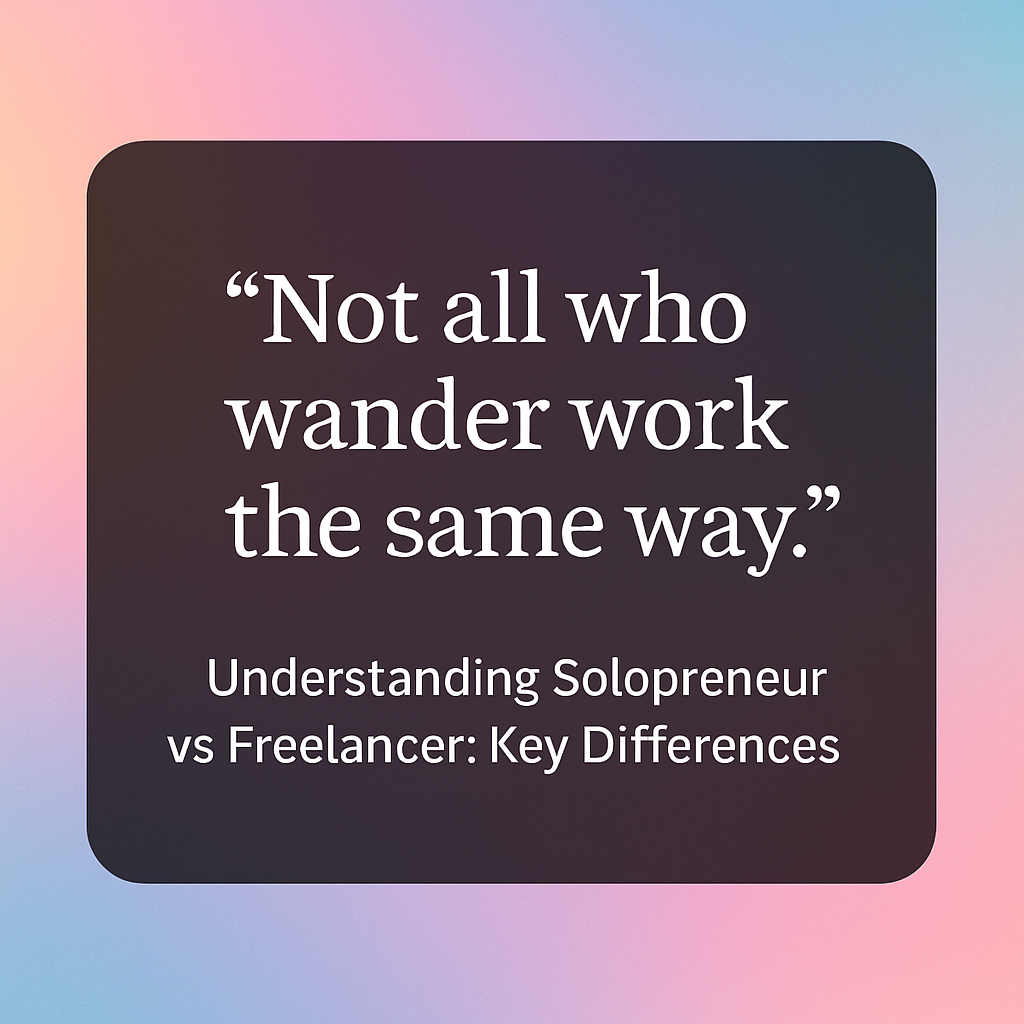
Millions of Americans are turning to independent work every year, carving out careers as either solopreneurs or freelancers. The differences between these two paths might seem small, yet solopreneurs are nearly twice as likely to pursue scalable business models and long term brand building than typical freelancers. Most people think picking between these roles is all about what kind of projects you take on. The real divide runs much deeper, shaping every choice from income strategy to long term ambitions.
Table of Contents
- Defining Solopreneur And Freelancer: Key Characteristics
- The Importance Of Knowing Solopreneur Vs Freelancer
- How Solopreneurs And Freelancers Operate In The Market
- Comparative Advantages Of Being A Solopreneur Vs Freelancer
- Real-World Context: Examples Of Solopreneurs And Freelancers
Quick Summary
| Takeaway | Explanation |
|---|---|
| Solopreneurs build scalable business models. | They create systems for sustainable growth, aiming for passive income rather than just hourly work. |
| Freelancers focus on immediate client projects. | Their work revolves around project-based tasks that provide direct income from specific skills. |
| Understanding these models aids career planning. | Knowledge of solopreneur and freelancer distinctions helps professionals align their strategies with long-term goals. |
| Solopreneurs develop a comprehensive brand identity. | They invest in building a recognizable brand and proprietary methodologies for their services. |
| Freelancers excel in adaptability and responsiveness. | They swiftly adjust their skills and offerings to meet client needs and market demands. |
Defining Solopreneur and Freelancer: Key Characteristics
Solopreneur vs freelancer highlights two distinct professional approaches within today’s independent work ecosystem. While both operate outside traditional employment structures, their underlying motivations, business strategies, and long-term perspectives show meaningful differences that shape how they grow and succeed.
Professional Identity and Business Focus
A solopreneur vs freelancer comparison shows two different ways of approaching independent work. A solopreneur sees their career as a full business venture, treating their skills as a scalable enterprise. In contrast, freelancers often trade time for money. Solopreneurs create systems and processes that enable passive income opportunities or allow growth beyond individual service delivery, aiming for sustainable, long-term expansion.

Freelancers, in contrast, typically concentrate on project based work, selling their specialized skills directly to clients. Their primary objective centers on securing consistent assignments that leverage their specific professional expertise. Learn more about transitioning from freelancing to a structured business model to understand how professionals evolve their career strategies.
Strategic Approach to Work and Income
According to research exploring collaborative behaviors on online platforms, freelancers demonstrate remarkable adaptability in project acquisition and client relationship management. Their work typically involves:
- Flexible project selection
- Direct client engagement
- Skill based pricing models
- Short term contract commitments
A solopreneur vs freelancer perspective shows how solopreneurs take a more holistic approach to their professional journey. They dedicate energy to building strong brand identities, developing unique methodologies, and creating sustainable revenue streams beyond direct service delivery. This mindset transforms their professional skills into a complete, self-sustaining business ecosystem.
The fundamental distinction lies not just in work style but in long term vision. Freelancers excel at immediate skill monetization, while solopreneurs strategically construct a business framework around their professional capabilities.
The following table compares the core characteristics of solopreneurs and freelancers to clarify their distinct approaches to independent work.
| Characteristic | Solopreneur | Freelancer |
|---|---|---|
| Business Model | Scalable, system-driven; aims for sustainable growth | Project-based; focuses on immediate income |
| Long-Term Focus | Building a brand and passive income options | Monetizing skills through client projects |
| Client Relationships | Develops broader business relationships, not just projects | Typically short-term, transactional client work |
| Revenue Streams | Multiple, potential for passive income | Direct service exchange; project-based revenue |
| Brand Identity | Comprehensive, invests in reputation and unique methods | Less emphasis, often operates under own name |
| Professional Autonomy | High, with control over business direction and scaling | High, with flexibility in choosing projects |
| Adaptability | Builds sustainable systems for long-term market changes | Excels at rapid skill acquisition and flexibility |
The Importance of Knowing Solopreneur vs Freelancer
Understanding the nuanced differences in a solopreneur vs freelancer discussion goes beyond terminology. This distinction shapes professional development, business strategy, and career trajectory in meaningful ways. Recognizing these differences empowers independent professionals to make informed choices about their approach to work and set the foundation for long-term growth.
Strategic Career Planning
According to research from the University of Phoenix, comprehending the unique characteristics of solopreneur and freelancer models allows professionals to align their work style with long term career objectives. The choice between these models impacts several critical aspects of professional life:
- Income generation potential
- Business scalability
- Personal brand development
- Professional autonomy
- Future expansion opportunities
Financial and Professional Positioning
The distinction between solopreneurs and freelancers significantly influences financial strategies and professional positioning. Freelancers typically focus on immediate income generation through project based work, while solopreneurs construct more comprehensive business frameworks designed for sustainable growth. Explore the best tools to support your professional journey to enhance your strategic approach.
By understanding these models, professionals can:
- Select appropriate business structures
- Design targeted marketing strategies
- Develop skill sets aligned with their professional goals
- Create more predictable revenue streams
- Build long term professional identities
Ultimately, recognizing the solopreneur versus freelancer paradigm empowers independent professionals to make strategic choices that optimize their career potential, financial stability, and personal fulfillment.

How Solopreneurs and Freelancers Operate in the Market
The independent professional landscape highlights complex operational strategies, where the solopreneur vs freelancer dynamic reflects two distinct approaches to navigating economic opportunities. Each model demonstrates a unique methodology for delivering services and building sustainable income streams.
Client Acquisition and Relationship Management
Freelancers primarily operate through transactional client relationships, focusing on short term project based engagements. Their market approach involves continuous networking, portfolio development, and securing individual assignments across diverse client bases. Learn about strategic niche positioning to enhance professional visibility and attract targeted clientele.
Their typical client engagement strategies include:
- Direct outreach through professional networks
- Bidding on project platforms
- Leveraging referral networks
- Presenting specialized skill portfolios
- Maintaining flexible pricing structures
Market Positioning and Revenue Generation
According to research exploring digital labor platforms, independent professionals are increasingly reorganizing traditional work arrangements. Solopreneurs distinguish themselves by developing comprehensive business models that transcend individual service delivery.
Key differences in market operation include:
- Solopreneurs create scalable service systems
- Freelancers focus on immediate project completion
- Solopreneurs invest in long term brand development
- Freelancers maintain project based income streams
While freelancers excel at monetizing skills quickly, a solopreneur vs freelancer comparison highlights how solopreneurs take a longer-term view. They strategically design business frameworks aimed at sustainable growth and potential passive income. This approach transforms individual expertise into scalable ecosystems that extend beyond one-to-one service delivery.
Comparative Advantages of Being a Solopreneur vs Freelancer
The professional landscape creates unique opportunities for independent workers, and a solopreneur vs freelancer perspective reveals distinct advantages tied to each operational model. Understanding these benefits allows professionals to align career strategies with both their long-term personal aspirations and financial growth goals.
Professional Autonomy and Growth Potential
Solopreneurs enjoy greater strategic flexibility compared to traditional freelancers. While freelancers excel at immediate skill monetization, solopreneurs construct comprehensive business frameworks designed for long term expansion. Explore strategies for professional scaling to understand how independent professionals can transform their work approach.
Key advantages for solopreneurs include:
- Potential for passive income generation
- Ability to create scalable business systems
- More comprehensive brand development
- Higher long term revenue potential
- Greater control over business direction
Adaptability and Market Positioning
According to research examining freelancer adaptation strategies, independent professionals must continuously evolve their approach to remain competitive. Freelancers demonstrate remarkable adaptability through:
- Rapid skill acquisition
- Flexible project selection
- Quick market responsiveness
- Diverse client portfolio management
- Specialized service offerings
A solopreneur vs freelancer comparison shows how solopreneurs set themselves apart by creating robust business infrastructures that extend beyond individual service delivery. Their model turns professional skills into comprehensive ecosystems capable of sustained revenue. While freelancers provide specialized services, solopreneurs position themselves as holistic business entities with greater potential for growth and market influence.
Real-World Context: Examples of Solopreneurs and Freelancers
The independent professional landscape includes diverse working models, and a solopreneur vs freelancer lens highlights dynamic approaches to career development and income generation. Real-world examples showcase the practical distinctions that separate these professional identities in practice.
Professional Profile Illustrations
Freelancers typically operate through skill based project delivery, maintaining multiple client relationships simultaneously. Learn strategies for effective outsourcing to optimize independent professional workflows.
Typical freelancer profiles include:
- Graphic designers working on individual design projects
- Content writers producing articles for multiple publications
- Web developers creating websites for different business clients
- Digital marketing specialists managing campaign strategies
- Translation professionals handling multilingual documentation
Business Model Differentiation
According to research examining independent worker demographics, independent professionals demonstrate remarkable diversity in their operational strategies. Solopreneurs distinguish themselves by developing comprehensive business frameworks that transcend individual service delivery.
Solopreneur examples encompass:
- Online course creators developing scalable educational platforms
- Podcast hosts generating revenue through sponsorships
- Digital product designers selling reproducible templates
- Software developers creating and monetizing mobile applications
- Personal coaches building comprehensive coaching ecosystems
A solopreneur vs freelancer perspective shows that while freelancers focus on direct service exchange, solopreneurs strategically design business models for sustainable growth. Their approach converts professional capabilities into comprehensive revenue systems that extend beyond personal labor, enabling scalability and long-term success.
This table outlines examples of typical professional profiles for solopreneurs and freelancers as described in the article.
| Professional Identity | Example 1 | Example 2 | Example 3 |
|---|---|---|---|
| Freelancer | Graphic designer for design projects | Content writer for multiple publications | Web developer for various business clients |
| Solopreneur | Online course creator | Podcast host with sponsorship revenue | Digital product designer selling templates |
Ready to Stop Juggling Multiple Tools and Start Growing Like a Pro?
Are you tired of wasting hours switching between apps, trying to act as both the business and the manager? This article explores the solopreneur vs freelancer challenge, showing how both struggle to simplify client acquisition, payments, and marketing while preserving independence. If this sounds familiar, you’re not alone. The solopreneur vs freelancerreality is that many independent professionals face these operational roadblocks, which slow growth and take precious time away from focusing on the work they truly love and want to expand.

Now you can simplify your business today. Fluum.ai combines sales funnels, booking, payment processing, and marketing into a single platform. Unlike generic tools, it is built for solo operators in wellness, coaching, consulting, and beyond. Integrate your favorite apps like Google Calendar and Stripe, use proven templates, and access guides designed to help you transition from reactive freelancing to proactive solopreneurship. Visit Fluum.ai pricing to see how you can automate your everyday tasks, gain more freedom, and start scaling with confidence right now.
Frequently Asked Questions
What is the main difference between a solopreneur and a freelancer?
A solopreneur typically builds a scalable business model focused on long-term growth, while a freelancer usually engages in project-based work with a focus on immediate skills monetization.
How do solopreneurs generate income compared to freelancers?
The solopreneur vs freelancer distinction shows how solopreneurs build comprehensive business frameworks aimed at sustainable revenue and passive income, while freelancers typically generate earnings through direct project-based service exchanges.
What are the strategic advantages of being a solopreneur?
The solopreneur vs freelancer distinction shows why solopreneurs enjoy more control over business direction, opportunities for passive income, and stronger brand development. This strategic approach creates higher long-term revenue potential and positions them for sustainable growth compared to project-based freelance work.
Can a freelancer transition into a solopreneur?
Yes, many freelancers can transition into solopreneurs by developing scalable business systems and focusing on building a brand identity that extends beyond just service delivery.



